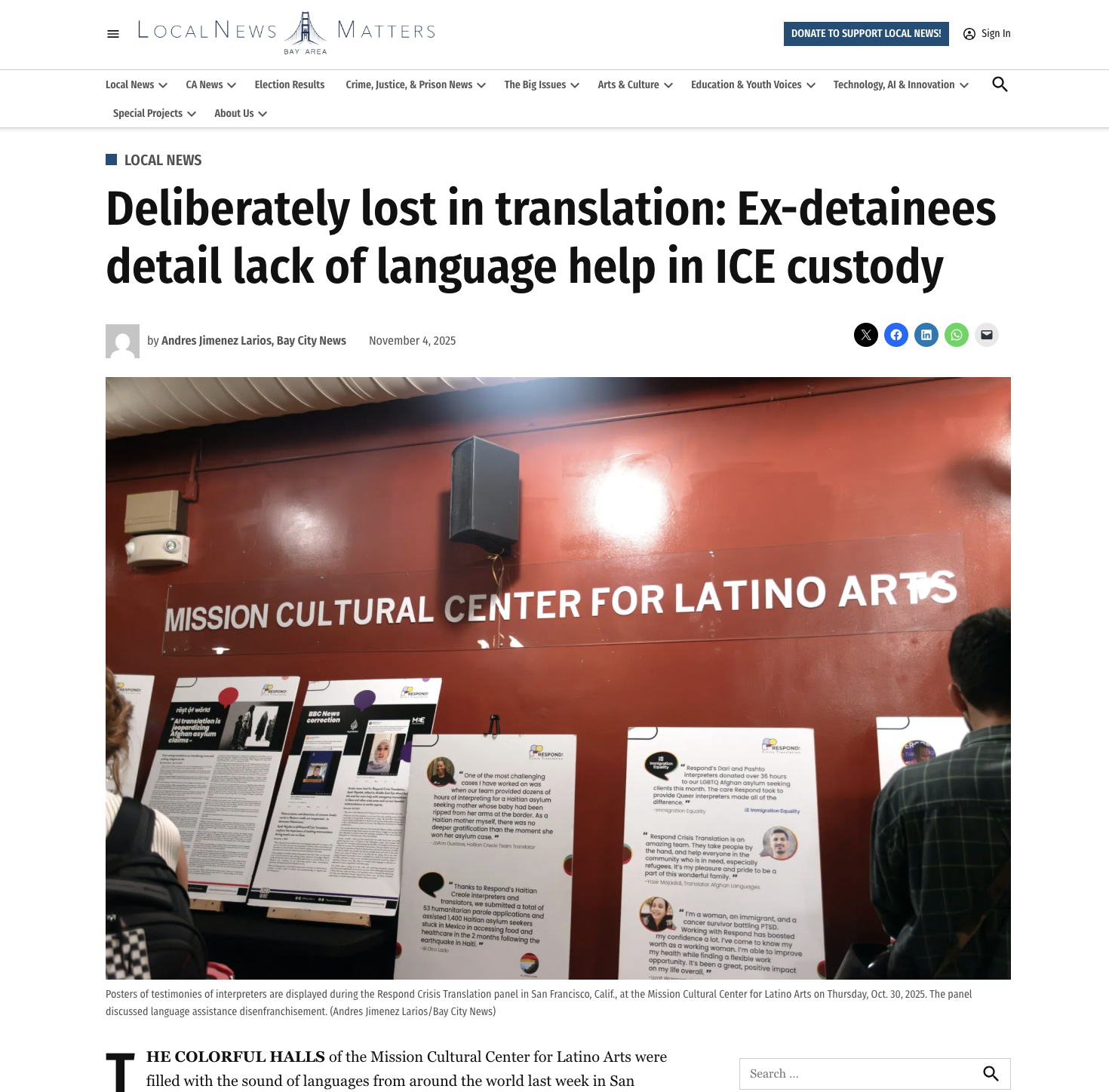Deliberately lost in translation: Ex-detainees detail lack of language help in ICE custody - RCT covered by Local News Matters
Last Thursday, Oct. 30, Respond Crisis Translation held a panel at the Mission Cultural Center for Latino Arts in San Francisco to talk about language depravation and it was covered by the LOCAL NEWS MATTERS media.
You can read the full article here. Below is a copy of the publication.
by Andres Jimenez Larios, Bay City News
November 4, 2025
THE COLORFUL HALLS of the Mission Cultural Center for Latino Arts were filled with the sound of languages from around the world last week in San Francisco as human rights activists gathered to detail the lack of language services for people facing life-threatening situations.
The nonprofit Respond Crisis Translation held a panel made up of speakers who were detained by U.S. Immigration and Customs Enforcement and faced tactics they allege intentionally isolated them through language barriers.
Ariel Koren, co-founder and executive director of Respond Crisis Translation, said the public should be more aware of the language injustice that migrants are facing under President Donald Trump’s administration. She said the government has implemented a “bring your own” interpreter policy, which means detainees are asked to source their own language services rather than being provided with assistance.
“This is nearly impossible for most people, as it is financially unfeasible, and there is a systemic interpreter deficit across this country,” said Koren.
According to Koren, mistranslations in asylum court proceeding and a lack of services has meant people swept up in Trump’s immigration crackdown are having to make decisions in English, a language many are not fluent in.
“The state then uses the mistranslations to justify dismissing cases detaining and deporting asylum seekers here in the Bay Area and across many other sites,” said Koren.
Respond Crisis Translation, commonly referred to as RCT, provides services for migrants and others in language-sensitive situations. It was started in 2019 and now the organization has over 3,000 language practitioners who speak over 200 languages, all of whom provide assistance free of charge.
Trump signed an executive order mandating English as the official language of the country in March. The U.S. Department of Justice then released a memo directing agencies how to adhere to the order.
The first action taken was reversing all previous guidance for programs for people with limited English proficiency and to “consider English-only services” for all public-facing agencies, as well as introducing technology like automatic translation services for migrants to cut costs related to employing interpreters.
According to the U.S. Department of Homeland Security’s language assistance website, detainees have language assistance from either dedicated interpreters or staff proficient in other languages. However, the site also states that the standards during their enforcement operations do not require language services to be provided for “detainees’ personal legal documents” or “for assistance with completing their benefit applications or forms,” citing a conflict of interest.
Quiet crisis of ‘language injustice’
Following Koren’s remarks at Thursday’s event was a panel made up of local residents who were initially detained by ICE but eventually released. They talked about their experiences in navigating the detention facilities and asylum courts but with limited English proficiency.
The former detainees requested to keep their full names private out of fear that federal immigration agents will retaliate for speaking out.
Felipe, a Colombia asylum seeker, said he fled his country after being threatened by corrupt government and paramilitary forces while advocating for farmworkers. Upon arrival in the U.S., he declared asylum but when he entered the process, he couldn’t access an interpreter. During his court proceedings, he said he couldn’t understand the documentation being provided to him and he wasn’t aware of the rights he had to have proper interpretation.
Peruvian migrant Antonela said she was detained in San Francisco after attending a regular immigration appointment. Upon telling the officials she had medical issues and could not understand what they were telling her, she said they ignored her pleas.
“Injured in the car, I asked them for help, but unfortunately, they said they did not care,” said Antonela. “In that moment I felt terrible. The only thing that came through my mind was that I was going to die.”
“It showed me how important all the tiny little details in the language are, and how one mistranslated word can mean a difference between somebody’s freedom or death.”
Anna Solodovnikova, formerly detained by ice
According to her, she underwent a four-hour interrogation and was pressured to sign documents that would waive her rights as a detainee and be deported. Without the help of outside language interpreters like RCT, she said the situation could have been very different.
Immigration attorney Abby Sullivan Engen, who works with the legal aid nonprofit Centro Legal de la Raza in Oakland, assisted in Antonela’s case.
“As an immigration lawyer, I have observed what everybody’s describing, this language injustice time and time again,” said Sullivan Engen.
Anna Solodovnikova spent two years in immigration custody. During that time, she said the people struggling with language services were too afraid to write grievances because it would affect their immigration cases.
“It showed me how important all the tiny little details in the language are, and how one mistranslated word can mean a difference between somebody’s freedom or death,” said Solodovnikova.



